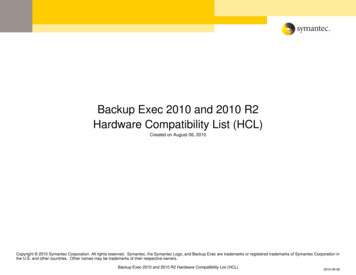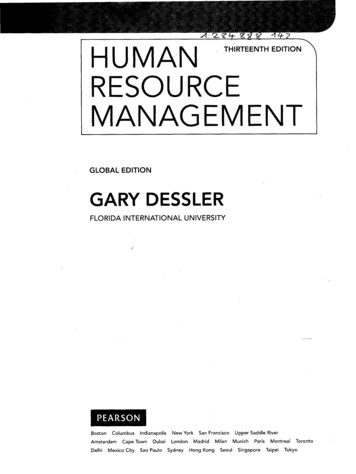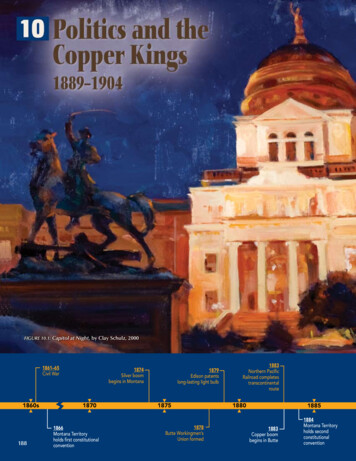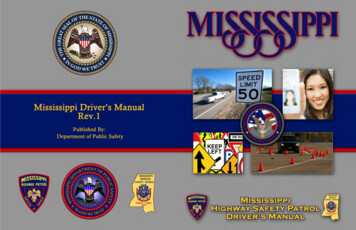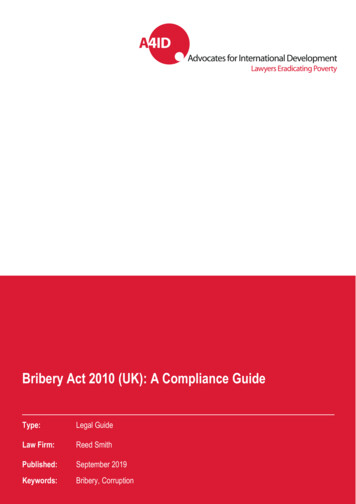
Transcription
Bribery Act 2010 (UK): A Compliance GuideType:Legal GuideLaw Firm:Reed SmithPublished:September 2019Keywords:Bribery, Corruption
This document provides general information and comments on the subject matter covered and isnot a comprehensive treatment of the subject. It is not intended to provide legal advice. Withrespect to the subject matter, viewers should not rely on this information, but seek specific legaladvice before taking any legal action.Any opinions expressed in this document are those of the author and do not necessarily reflect theposition and/or opinions of A4ID. Advocates for International Development 2017
Bribery Act 2010 (UK): A Compliance GuideExecutive Summary The Bribery Act 2010 applies to all partnerships and incorporated organisations (bywhatever means), provided they are engaged in commercial activities, irrespective of thepurpose for which profits are made. It is a criminal offence to bribe another person, receive a bribe, bribe a foreign public officialor for commercial organisations failing to prevent bribery. NGOs should carefully consider acts undertaken by all associated persons and implementadequate policies and procedures to ensure compliance with the Bribery Act 2010. Recommended policies and procedures include risk assessment, implementation ofprocedures to reduce risk, communication (including training), due diligence, plannedmonitoring/ review and improvement. NGOs may not be able to prevent all bribes. All instances of actual or potential bribery shouldbe met with prompt detection, rejection (note – on occasion this may not be possible due torisk of life or liberty), investigation, external reporting (where necessary) and record keeping.
ScopeThis guide provides an overview of the main principles, processes and requirements underthe UK Bribery Act 2010 (UKBA), and how to both prevent and deal with bribery from theperspective of NGOs.Context and HistoryPrevious anticorruption legislationPrevious anti-corruption legislation was outdated and not compliant with theOrganisation for Economic Co-operation and Development’s recommendations forglobal changeThe UKBA consolidated and modernised the law on bribery in the UK, effective from1 July 2011The UKBA is considered the toughest anti-corruption legislation in the world: wide in scope (in terms of potential geographical and sectoral remit); few defences; and stiff penaltiesInternational enforcement activities in the investigation and prosecution ofcorruption are increasingThe provisions of the UKBA are not retrospectiveOverviewOffences under theBribery Act 2019Receiving Royal Assent on 8 April 2010, which came into force on 1 July 2011, the BriberyAct 2010 (the “Act”), replaces previous legislation, creating four criminal offences in relationto bribery:1. Section 1 – Offences of bribing another person2. Section 2 – Offences relating to being bribed3. Section 6 – Bribery of foreign public officials4. Section 7 – Failure of commercial organisations to prevent bribery
For a number of reasons, the Bribery Act 2010 is being deemed an onerous piece oflegislation, mostly due to its widespread application and the, albeit vague, requirements forcommercial organisations to implement “adequate provisions” to prevent bribery. Carefullyconsider the following offences in more detail to clarify scope and guide policy andprocedure implementation.Extra-territorialapplicationSection 12 of the Act sets out the territorial application of the offences listed above.In relation to (1), (2) and (3), an offence is committed if:(a) any act or omission, which forms part of the offence takes place in the United Kingdom,or(b) an act or omission by a person with a close connection to the United Kingdom, doneor made outside of the United Kingdom would form part of an offence if done or madein the United Kingdom.In relation to (4), an offence is committed irrespective of whether the acts or omissionswhich form part of the offence take place in the United Kingdom or elsewhere.Close connectiontestFor the purposes of (b) above, a person is deemed to have a close connection withthe United Kingdom if, the person was one of the following at the time the acts oromissions concerned were done or made: a British citizen a British overseas territories citizen a British National (Overseas) a British Overseas citizen a person who under the British Nationality Act 1981 was a British subject a British protected person within the meaning of that Act an individual ordinarily resident in the United Kingdom a body incorporated under the law of any part of the United Kingdom a Scottish partnershipAdditionally, Paragraph 35 of the Ministry of Justice’s (MoJ) ‘The Bribery Act 2010 –Guidance’ states that, “So long as the organisation in question is incorporated (by whatevermeans), or is a partnership, it does not matter if it pursues primarily charitable or educationaims or purely public functions. It will be caught if it engages in commercial activities,irrespective of the purpose for which profits are made.”
Overview of theoffencesFour main offences under the UKBASection 1 – Offences of bribing another personSection 2 – Offences relating to being bribedSection 6 – Bribery of foreign public officialsSection 7 – Failure of commercial organisations to prevent briberyExtra-territorialapplicationSections 1, 2 & 6 apply to: Persons committing the act in the UK; andPersons committing the act outside of the UK, provided that:i.it would be an offence in the UK; and (ii) the person committing the Act has a‘close connection’ with the UKSection 7 applies to: Commercial organisations incorporated in the UK; or Commercial organisations carrying on a business or part of a business in the UKA particular concern to international organisationswith UK presence As you will discover, Section 7 holds organisationsliable where the bribe is made by any ‘associated’person performing services for or on behalf of theorganisation (this includes employees, subsidiaries,branches or other third parties in other jurisdictions).That person’s actions need not occur in the UK andneed not have connection with the UK.
Basic PrinciplesWhat is bribery?The offering, promising, giving, accepting or soliciting of money, gifts or otheradvantage as an inducement to do something that is illegal or a breach of trust inthe course of carrying out an organisation’s activities.Section 1: Offences of bribing another personSection 1Section 1 makes it an offence for a person (‘P’) to offer, promise or give financial orother advantage to another person in one of two cases:Case 1Applies where P intends the advantage to induce a person to perform improperly arelevant function or activity, or to reward a person for the improper performance of such afunction or activity (whether the person to whom the advantage is offered, promised orgiven is the same person as the person who is to perform, or has performed, the functionor activity concerned)*ExamplePerson A gives Person B tickets to the Wimbledon tennis tournament, so thatPerson B awards Person A a large contract.Case 2Applies where P knows or believes that the acceptance of the advantage would itselfconstitute the improper performance of a relevant function or activity*
ExamplePerson B knows that by accepting tickets to the Wimbledon tennis tournament, itwill have to give something to Person A in return.* It does not matter whether the advantage is offered, promised or given by P directlyor through a third partySection 2Section 2: Offences relating to being bribedSection 2 makes it an offence for a person (‘R’) if any of the followingcases apply:Case 3: Bribes that intend ‘improper performance’Applies where R requests, agrees to receive or accepts a financial or other advantageintending that, in consequence, a relevant function or activity should be performedimproperly (whether by R or another person).ExamplePerson A accepts tickets to the Wimbledon tennis tournament from Person B, andin response, offers Person B a large contract.Case 4: Bribes that constitute ‘improper performance’Applies where R requests, agrees to receive or accepts a financial or other advantage,and the request, agreement or acceptance itself constitutes the improper performance byR of a relevant function or activity.ExamplePerson A requests tickets for the Wimbledon tennis tournament from Person B forPerson B to be considered in contract tendering process.Case 5: Bribes that reward ‘improper performance’Applies where R requests, agrees to receive or accepts a financial or other advantage asa reward for the improper performance (whether by R or another person) of a relevantfunction or activity.ExamplePerson A accepts tickets to the Wimbledon tennis tournaments from Person B, asa reward for offering Person B a large contract.Case 6: Bribes accepted in anticipation or in consequence of ‘improperperformance’Applies where, in anticipation of or in consequence of R requesting, agreeing to receiveor accepting a financial or other advantage, a relevant function or activity is performedimproperly by R or by another person at R’s request or with R’s assent or acquiescence(it does not matter whether that person knows or believes that the performance of thefunction or activity is improper).
ExamplePerson A, in anticipation of receiving tickets to Wimbledon tennis tournament fromPerson B, offers Person B a large contract.In any of the cases above, it does not matter whether R requests, agrees to receive or accepts(or is to request, agree to receive or accept) the advantage directly or through a third party,or whether the advantage is (or is to be) for the benefit of R or another person.In cases 4–6 above, it does not matter whether R knows or believes that the performance ofthe function or activity is improper.Key definition: improperperformance‘Improper performance’ is defined in Section 3, 4 and 5 of the ActIn summary, this means performance that amounts to a breach of an expectationthat a person will act in good faith, impartially, or in accordance with a position oftrust.The offence applies to bribery relating to any: function of a public nature,connection with a business,performance in the course of a person’semployment, or performance on behalf of a body ofpersons (whether corporate or unincorporated).Therefore, coveringboth private andpublic sectorsExpectation test‘What a reasonable person in the United Kingdom would expect in relation to theperformance of the type of function or activity concerned’.Where the performance of the function or activity is not subject to UK law (for example, ittakes place in a country outside UK jurisdiction), then any local custom or practice mustbe disregarded – unless permitted or required by the written law applicable to thatparticular county.Section 6: Bribery of foreign public officialsSection 6Section 6 introduces a standalone offence relating to the bribery of a foreign publicofficialCase 7Applies where a person (‘P’) bribes a foreign public official (‘F’) if: P’s intention is to influence F in F’s capacity as a foreign public official, AND P intends to obtain or retain business or an advantage in the conduct of business, AND P directly or through a third party, offers, promises or gives any financial or otheradvantage to F or to another person at F’s request or with F’s assent or acquiescence, AND
F is neither permitted nor required by the written law applicable to F to be influence inF’s capacity as a foreign public official by the offer, promise or gift. ExamplePerson A offers Person B, a foreign public official, tickets to Wimbledon tennistournament intending to receive a large contract which is being tendered from PersonB’s department.‘Foreign public officials’ Holds a legislative, administrative or judicial position;Exercises a public function for or on behalf of a country or territory outside theUnited Kingdom;Exercises a public function for any public agency or public enterprise of that countryor territory; orAn official or agent of a public international organisation.Examplescivil servants, professional judges and lay judges, public prosecutors, employees ofa public authority (tax office, building authority, Ministry of energy, Immigration andCustoms officials), employees of municipal utilities, and ministers, parliamentarystate secretaries, data protection supervisors or notary publics.Offences under sections 1, 2 and 6 by corporate bodiesOffences bycorporate bodiesIn considering the offences listed above, if the offence is proved to have been committedwith consent or connivance of either: a senior office of the body corporate, OR a person purporting to act in such a capacity,the senior officer or person (as well as the body corporate) is guilty of the offence and liableto be proceeded against and punished accordingly.Definitions“director” - in relation to a body corporate whose affairs are managed by its members,means a member of the body corporate“senior officer” - in relation to a body corporate, a director, manager, secretary or othersimilar officer of the body corporate
Section 7: Failure of commercial organisations to prevent briberySection 7Section 7 introduces an obligation on commercial organisation to prevent bribery.Case 8A relevant commercial organisation (‘C’) is guilty of an offence under this section ifa person (‘A’) associated with C bribes another person intending to either: Obtain or retain business for C, OR Obtain or retain an advantage in the conduct of business for C.ExampleCommercial Organisation C fails to have adequate procedures to prevent bribery,and as a consequence Person A, one of its UK Citizen employees, offers tickets toWimbledon tennis tournament to Person B in exchange for a large contract in Kenya.Defence?It is a defence for C IF they can prove that they had in place ‘adequate procedures designedto prevent persons associated with C from undertaking such conduct’.‘Associated persons’A person is ‘associated’ if they ‘perform services’ for OR on behalf of the commercialorganisation, regardless of the capacity in which they perform services.**this person can be an individual or an incorporated or unincorporated body.Associated testThe question whether a person is performing services for an organisation is to be‘determined by reference to all the relevant circumstances and not merely by reference tothe nature of the relationship between A and C’.‘Relevant commercial organisation’ A body incorporated under the law of any part of the United Kingdom and which carrieson a business (whether there or elsewhere), ORAny other body corporate (wherever incorporated) which carries on a business, or partof a business, in any part of the United Kingdom, ORA partnership (within the Partnership Act 1890, or limited partnership registered underthe Limited Partnerships Act 1907) which is formed under the law of any part of theUnited Kingdom and which carries on a business (whether there or elsewhere), ORAny other partnership (whether formed) which carries on a business, or part of abusiness, in any part of the United Kingdom* For the purposes of this section, a trade or profession is a business.
‘Adequate procedures’AdequateproceduresThe UK MoJ has published official guidance on procedures that relevant commercialorganisations can put into place to prevent persons associated with them from bribing on/bribery-act-2010-guidance.pdf)In consideration of what is deemed ‘adequate’, a Select Committee constituted by theHouse of Lords in 2018 approached this topic in the appropriately named subsection‘Adequate v reasonable’.At paragraphs 196-211 of ‘The Bribery Act 2010: Post-Legislative Scrutiny’ the Committeeconsidered the issue that in events where bribery has taken place within a commercialorganisation, the occurrence of the bribery in itself could give rise to a claim that the policieswere ‘inadequate’ to prevent bribery.The Committee instead moved to amend the statutory Guidance to make clear that‘“adequate” does not mean, and is not intended to mean, anything more stringent than“reasonable in all the circumstances”.Implementation of anti-bribery policies and proceduresThe MoJ guidance advises that all procedures implemented by commercial organisationswishing to prevent bribery should be informed by six principles:1Proportionate procedures“Adequate bribery prevention procedures ought to be proportionateto the bribery risks that the organisation faces.”2Top-level commitment3Risk assessment4“Those at the top of an organisation are in the best position to fostera culture of integrity where bribery is unacceptable.”“To promote the adopting of risk assessment procedures that areproportionate to the organisation’s size and structure and to thenature, scale and location of its activities.”Due diligence“A form of bribery risk assessment and a means of mitigating risk.”
56Communication (including training)“Communication and training deters bribery by associated personsby enhancing awareness and understanding of a commercialorganisation’s commitment to their proper application.”Monitoring and review“Commercial organisations will therefore wish to consider how tomonitor and evaluate the effectiveness of their bribery preventionprocedures and adapt them where necessary.”Assessment of your company: ProceduresIn considering what is deemed ‘adequate’ for your given organisation, the following process should be undertaken toevaluate, implement and improve the policies and procedures required to ensure compliance with the Bribery Act 2010.Stage 1: InitialassessmentEach NGO will need to assess the level; nature and complexity of the risk involved acrossthe entire organisation and should be informed by an initial risk assessment. All subsequentprevention policies and procedures should be based off these findings.Common encountered risksExternal risk factors Geographical – risks may behigher in certain countries orregions within countries.Activities in urban areas maypose different risks to activitiesin rural areas.Cultural – in certain culturesand work environments, bribesmay be seen as “business asusual”.Emergency relief – the timepressure and security contextmay increase risk.Sector – the nature of thesector in which an NGO worksmay pose specific risks (eg.construction,healthcare,water, forestry).Organisation risk factors Existing policies and procedures –risk that existing policies andprocedures are not adequate oreffective. Legal/prosecution – risks of noncompliance with UK and overseaslegislation,andsubsequentprosecution. Reputation – risk of reputationaldamage following a bribery scandal.
Stage 2: Planning andinitial implementationPartners – many NGOs workthrough partners, who will alsoneed to be assessed for thebribery risk they may bring.Procurement – increased riskwhere processes are not fair ortransparent. Procurement is ahigh-risk area for bribery.Transactions–certaintransactions may carry higherrisk; for example, payments togovernment officials, majorcontracts and paymentsthrough third parties.Recruitment – bribes can beoffered or sought as part ofrecruitment processes.New activities – there may beincreasedriskwhenorganisationsstartnewactivities in which they havelimited experience, such ashumanitarian relief in a tions –bribes may be offered throughsponsorship of events or uponreceipt of donationsWith all potential risks identified, your organisation will need to plan possibleactions and the implementation of anti-bribery policies and procedures. We haveset out below specific risk for NGOs with their respective actions.
Stage 3: FullimplementationTo complete implementation, we recommend ensuring all staff are trained on theorganisations anti-bribery policies and are aware of when and how to action therequired procedures. Effective communication, training and understanding of whento carry out due diligence are vital.Communication (and training)Acting as a deterrent of bribery through enhancing awareness and understanding ofthe organisations procedures and their commitment to proper application.Consider Internal communications – messaging and providing a platform for internal andexternal parties to raise concerns about bribery External communications – statement or code of conduct in relation to briberyprevention policies Annual training – establishing an anti-bribery culture through education andawareness of threats posed by bribery Education surrounding the use of anti-bribery and anti-corruption clauses indocumentationDue diligenceActs as a mean to both assess and mitigate risk.Consider Risks arising from the initial assessment and the level of due diligence each riskrequires Resourcing – can be undertaken internally or by external consultants Potential new business relations – often difficult to extricate from a businessrelationship once established Incorporating due diligence into recruitment and human resources procedures –employees are considered ‘associated’ with the commercial organisation thereforemitigating the risks of bribery being undertaken by the workforceExamples where/when to carry out due diligence New and existing partners Relations with suppliers, contractors and other third parties Procurement process Accepting gifts, hospitality and charitable donations Conflicts of interest
Stage 4: Evaluationand improvementAs commercial organisations change over time, so too may the nature and scale ofthe activities and the risks they pose in relation to bribery.Consider Implementing a regular review of the risks faced by the organisations – you maywish to seek a form of external verification or assurance in relation to theeffectiveness of anti-bribery procedures Evaluating the effectiveness of current bribery prevention procedures –including through staff questionnaires and feedback Adapting current procedures where necessary External review mechanisms to deter, detect and investigate bribery, as well asmonitor the ethical quality of transactionsDealing with briberyDealing with briberyNGOs with a zero-tolerance approach may not be able to prevent all instances of bribery.Adopting a clear procedure for actual or potential occurrences enables a prompt andproperly conducted response.A) Detection and rejection NGOs should make clear their stance on rejecting demands for or offers of bribes Duress In circumstances where payment might not be avoided (i.e. where health orsecurity is seriously at risk) NGOs should plan their operations and have security procedures in place toreduce these risksUseful tool: RESIST: Resisting Extortion and Solicitation in International Transactions– identifies scenarios and gives suggestions on how to respond (TransparencyInternational) 1B) Investigation1 NGOs may not be able to prevent all bribes. Any instances of actual or potential briberyshould be met with a prompt and proper investigation Investigation blication/resist resisting extortion and solicitation in international transactions
Confirmation of whether bribe has taken place, and identifying who wasresponsible Assessment of internal controls and procedures Identifying required improvements to proceduresNGOs will also need to consider appropriate subsequent action, depending on theinvestigation findings. This may include disciplinary procedures and external reporting(see below)C) External reporting NGOs should consider putting in place policies and procedures for externallyreporting cases of bribery* Depending on the case in question this could include: Reporting to the police or other law enforcement agencies (e.g. in the UK, theSerious Fraud Office has the primary responsibility for enforcement of the BriberyAct) Reporting to a senior official or director of the external organisation Reporting to an appropriate government department, in the country where theincident took place Reporting to the Charity Commission, if considered a ‘serious incident’ Reporting to professional bodies (e.g. accountancy bodies) or trade associations*NGOs should assess the risks involved in reporting incidents on a case-by-case basisD) Record keeping NGOs should keep a record of any bribes offered, made, solicited or received,including attempted and actual bribes, frauds and similar losses and financialirregularities Record keeping allows NGOs to understand the extent and nature of briberyaffecting their organisations - this can be used to inform risk management processesand helps to ensure control measures put in place are proportionate to the risk.Penalties and sanctionsPenalties andsanctionsUnder the Bribery Act 2010, both individuals and companies are liable to penalties. For NGOs,being found guilty of an offence can not only lead to unlimited fines, but also seriousimplications from reputation damages.
IndividualsUnder section 1, 2 or 6On summary conviction, individuals areliable to: imprisonment up to 12 months, and unlimited fine, OR bothCompaniesUnder section 1, 2 or 6On summary conviction, are liable to: an unlimited fineConviction on indictment, individuals areliable to: imprisonment up to 10 years, an unlimited fine, OR bothUnder section 7Conviction on indictment, liable to: an unlimited fineConviction on indictment, liable to: an unlimited fineReputation damageBeyond the possible penalties list above, any NGO linked to bribery in any way can beextremely damaging to its reputation and undermine the trust and support ofbeneficiaries, partners, the wide public and donors.Additionally, an NGO convicted of a bribery offence is likely to be debarred fromparticipation in future public contracts.
If you would like more information about the subjects covered in this document or if yourorganisation is interested in receiving free legal advice by becoming a development partner ofA4ID please contact probono@a4id.org. Advocates for International Development 2017
Bribery Act 2010 (UK): A Compliance Guide . Executive Summary The Bribery Act 2010applies to all partnerships and incorporated organisations (by whatever means), provided they


